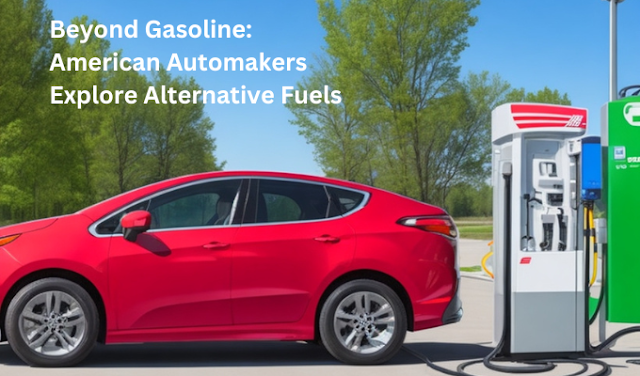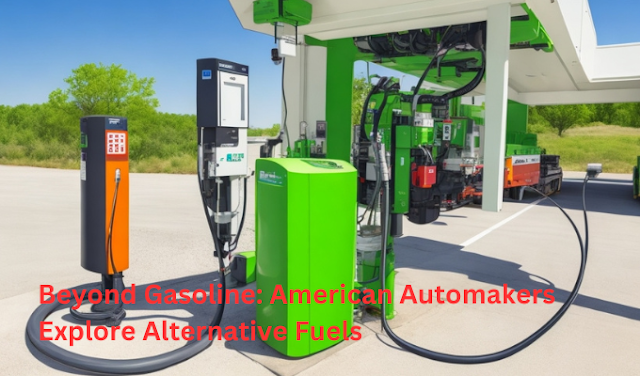Beyond Gasoline: American Automakers Explore Alternative Fuels for a Sustainable Future
As the world increasingly acknowledges the urgency of addressing climate change and transitioning to a more sustainable future, the automotive industry is stepping up its efforts to reduce its environmental impact.
American automakers, renowned for their innovation and engineering prowess, are actively exploring alternative fuels as a promising solution to move beyond traditional gasoline-powered vehicles.
This article delves into the exciting developments in the realm of alternative fuels and highlights the efforts made by American automakers to build a sustainable transportation future.
Table of Contents
1. Introduction
2. The Need for Alternative Fuels
3. Electric Vehicles: Leading the Charge
4. Hydrogen Fuel Cell Vehicles: Harnessing the Power of Hydrogen
5. Biofuels: Tapping into Renewable Energy Sources
6. Natural Gas: A Cleaner Burning Fuel
7. The Role of American Automakers
8. Collaborations and Partnerships
9. Infrastructure Challenges and Solutions
10. Government Support and Incentives
11. Consumer Adoption and Education
12. The Road Ahead: Overcoming Barriers
13. Conclusion
14. FAQs
The detrimental environmental impact of traditional gasoline-powered vehicles, coupled with the finite nature of fossil fuels, has propelled American automakers to explore alternative fuels. These fuels offer the promise of reduced greenhouse gas emissions and decreased dependence on non-renewable resources, paving the way for a sustainable and greener future.
The Need for Alternative Fuels
The need for alternative fuels arises from the pressing concerns of climate change and the detrimental effects of greenhouse gas emissions on the environment. Traditional gasoline-powered vehicles contribute significantly to carbon dioxide emissions, which are a major contributor to global warming. By adopting alternative fuels, American automakers can actively mitigate their carbon footprint and contribute to global efforts to combat climate change.
Electric Vehicles: Leading the Charge
Electric vehicles (EVs) have emerged as the leading alternative to gasoline-powered cars. By utilizing electricity as their primary power source, EVs produce zero tailpipe emissions and offer the potential for a significant reduction in greenhouse gas emissions. American automakers have made substantial investments in EV technology, developing innovative electric models that cater to various consumer needs and preferences.
Hydrogen Fuel Cell Vehicles: Harnessing the Power of Hydrogen
Hydrogen fuel cell vehicles (FCVs) present another promising avenue for sustainable transportation. These vehicles use hydrogen gas and convert it into electricity, producing only water vapor as a byproduct. American automakers have invested in research and development to improve the efficiency and affordability of FCVs, and to commercialize this technology shortly.
Biofuels: Tapping into Renewable Energy Sources
Biofuels offer a renewable and environmentally friendly alternative to conventional gasoline. They are derived from organic matter, such as crops and agricultural waste, and can be used as a substitute for gasoline in certain vehicles. American automakers have explored various biofuel options, including ethanol and biodiesel, and have developed vehicles capable of running on these fuels.
Natural Gas: A Cleaner Burning Fuel
Natural gas, primarily composed of methane, is another alternative fuel gaining attention in the automotive industry. It burns cleaner than gasoline, emitting fewer pollutants and greenhouse gases. American automakers are exploring the potential of natural gas as a viable alternative fuel, particularly for heavy-duty vehicles such as trucks and buses.
The Role of American Automakers
American automakers have a crucial role to play in driving the adoption and advancement of alternative fuels. With their extensive resources, technical expertise, and manufacturing capabilities, they have the potential to shape the future of sustainable transportation. Here are some key aspects of their role:
Collaborations and Partnerships
American automakers understand the significance of collaboration in achieving their sustainability goals. They actively seek partnerships with other industry players, including technology companies, energy providers, and research institutions. Collaborations enable the sharing of knowledge, resources, and infrastructure to accelerate the development and deployment of alternative fuel technologies.
Infrastructure Challenges and Solutions
One of the critical challenges in transitioning to alternative fuels is the establishment of a robust and widespread infrastructure. American automakers are actively working to address this challenge by investing in charging stations for electric vehicles, hydrogen refueling stations for fuel cell vehicles, and promoting the accessibility of biofuel and natural gas refueling facilities.
They collaborate with governments and private entities to expand the infrastructure network, making alternative fuels more convenient and accessible for consumers.
Government Support and Incentives
American automakers rely on supportive government policies and incentives to drive the adoption of alternative fuels. They actively engage with policymakers to advocate for regulations that promote the production, sale, and use of alternative fuel vehicles.
Additionally, they work closely with government agencies to secure grants, tax incentives, and other financial benefits that encourage consumers to choose alternative fuel vehicles.
Consumer Adoption and Education
American automakers understand the importance of consumer acceptance and demand for alternative fuel vehicles. They invest in extensive marketing campaigns to raise awareness and educate consumers about the benefits of these vehicles. By highlighting their environmental advantages, cost savings, and performance capabilities, automakers aim to dispel misconceptions and encourage consumers to consider alternative fuel vehicles as a viable option.
The Road Ahead: Overcoming Barriers
While American automakers have made significant strides in the development of alternative fuel technologies, there are still challenges to overcome. These include improving the affordability and range of electric vehicles, enhancing the efficiency and durability of fuel cell vehicles, and addressing concerns related to the production and sustainability of biofuels. Automakers continue to invest in research and development to overcome these barriers and make alternative fuels a mainstream choice for consumers.
Conclusion
American automakers are at the forefront of the pursuit of sustainable transportation through the exploration of alternative fuels. By investing in research, collaborating with partners, advocating for supportive policies, and educating consumers, they are driving the shift toward a greener and more sustainable future. With their commitment to innovation and environmental stewardship, American automakers are playing a vital role in shaping the future of transportation.
FAQs
1. Are alternative fuel vehicles more expensive than gasoline-powered vehicles?
- While some alternative fuel vehicles may have a higher upfront cost, factors such as fuel savings, tax incentives, and lower maintenance costs can offset the initial investment. Additionally, as technology advances and production scales up, the prices of alternative fuel vehicles are expected to become more competitive.
2. How can I find alternative fuel refueling stations near me?
- There are various online platforms and mobile applications available that provide maps and information on the location of alternative fuel refueling stations. Additionally, automaker websites and customer service centers can assist in locating nearby refueling infrastructure.
3. Are alternative fuel vehicles as powerful and efficient as gasoline-powered vehicles?
- Advancements in alternative fuel technologies have significantly improved the power and efficiency of these vehicles. Electric vehicles, for example, offer instant torque and impressive acceleration. Fuel cell vehicles provide long-range capabilities, while biofuels and natural gas can deliver comparable performance to gasoline-powered vehicles.
4. What is the environmental impact of alternative fuels?
- Reduced Greenhouse Gas Emissions: Alternative fuels help mitigate climate change by reducing greenhouse gas emissions. Electric vehicles produce zero tailpipe emissions, resulting in a significant reduction in carbon dioxide, nitrogen oxides, and other harmful pollutants. Hydrogen fuel cell vehicles emit only water vapor as their byproduct. Biofuels, derived from renewable sources, have lower carbon emissions compared to fossil fuels.



